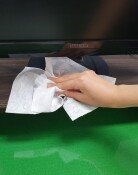
Set to marry this year, graduate student Jeong Ji-eun (28female) gets a panic attack when she hears colleagues and friends talk about childrearing. She says, Theres stress on raising your yet unborn child, what with prenatal care and infant gymnastics, educational programs, and talk of needing to speak English well to converse with your childs English instructor.
Kwon Soo-ah (29, Seodaemun-gu, Seoul) goes to music playroom classes with her 6-month-old baby. The classes are chaotic and she wonders if theres really any learning to be done, but when she exchanges information with other mothers there, she feels that she cant lose the competition. This is only the beginning.
After kids pass through elementary school and go to middle school, studies become closely related with college entrance exams. Believing that studying decides a childs future, mothers become their childrens custom-made managers. Studying strategies, private studying lessons, time and health management, and even managing which friends their child will have all become a full-time job for mothers to secure their childrens future.
Stay-at-home mom Lee Sang-hee (39, Jongno-gu, Seoul) sent her only daughter to a specialized high school last year. Shes used to compliments from other people, but because her sisters-in-laws children attend prestigious colleges in Korea and abroad, she feels a sense of competition and anxiety, and feels she cant rest until her daughter is safely in college.
Because she thinks her house is too old and the transportation problem too inconvenient to hire private tutors, she got a one-room flat between the school and house as a study room. She believes this is necessary for better results. Mothers these days also pick up on rumors about tutors, and watch their childrens competitors to see which private cram schools they attend. A firm bond between other mothers is a must. During information exchanges, it could be a terrible blow to a mother if a child is treated as an outcast. Mothers are indeed stressed.
Homemaker Y (38), who lives in Yeouido, Seoul, says, A childs performance is a function of a mothers competence, so the mothers of kids who have good scores are naturally arrogant. You have to get rid of any self-respect you thought you had sometimes to get the education information you want.
In the past, housewives used to focus on household duties, but nowadays the trend is leaning toward successful parenting. In a society like this, a mother whose child does not adhere to these standards may feel a great amount of alienation.
Hwang Seon-hee (49, Gangnam-gu, Seoul) confesses, No matter how well we provide for our high school sophomore, no private academy wants a child whose grades are mediocre. Why is my child an underachiever? I feel like theres something I did wrong and Im just miserable.
There are some mothers who fear spending their elderly years meaninglessly because theyve focused too much on their children and have no lives of their own. Na (42, Seongnam, Gyeonggi) sent her two middle school-aged children to study abroad in the United States. The family finances are in trouble, but she believed it was the best decision they could make for their childrens future as parents. Im afraid that well suffer in our later years because we didnt prepare, but theres nothing to be done.
Experts advise, Parents and children should have a symbiotic relationship. They shouldnt try to be super moms and super kids, but rather power moms and power kids. Mothers need to remember that they arent their childrens managers, but assistants. Mothers should find their own vocations in religious activities or various hobbies so that children may have a chance to become independent.
elleshe9@hanmail.com







